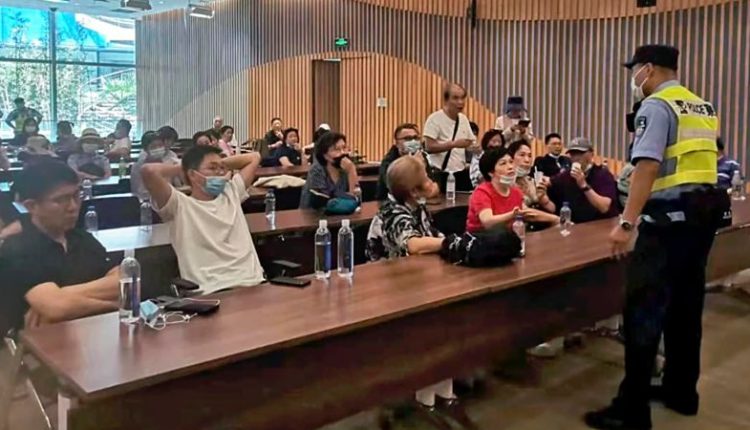Chinese police have detained some staff of Evergrande’s wealth management unit after the company failed to repay investors, in the first criminal probe launched against the embattled property developer since it was hit by a massive debt crisis in late 2021.
Shares in the company tumbled as much as 26% in Hong Kong on Monday but recovered most of its loses to trade at 61 Hong Kong cents (8 US cents).
Police in the southern megacity of Shenzhen, where Evergrande is headquartered, said Saturday in a statement they had recently detained some staff at Evergrande Wealth, which has been raising funds for its parent firm from individual and corporate investors as part of China’s shadow banking sector since the unit’s founding in 2015.
The statement said police are investigating and encouraged the company’s investors to provide information.
It identified one of the detainees as having the surname “Du,” but didn’t provide other details, such as when the detentions took place and the nature of the allegations.
The state-owned Shanghai Securities Journal reported that one of the detainees is the general manager and legal representative of Evergrande Wealth, citing an unnamed source.
CNN has reached out to Evergrande and Evergrande Wealth for comment about the investigation, but hasn’t received a response.
On Saturday, the Shenzhen government’s press office posted an article on its official WeChat account giving more detail about the detentions, saying that Evergrande Wealth was suspected of “illegal fundraising.”
“According to the current public information, Evergrande Wealth and its related parties illegally collected funds to form an internal fund pool, violated the contract and mismatched product investment directions and deadlines, causing losses to investors,” the article said.
The police action was intended to establish a criminal case in a “timely” manner, which will be conducive to the recovery of damages and may reduce losses suffered by investors, it added.
The statement said the detention of the Evergrande employees would have “a positive significance in regulating and stabilizing the financial market,” it said.
Evergrande was formerly one of China’s largest developers by sales. But it’s laden with huge amounts of debt, thanks to years of aggressive borrowing to fund its land buying spree. In December 2021, the company defaulted on its debt, sparking a massive property crisis in the world’s second largest economy, which continues to deal with the aftermath.
Other than bank loans and bonds, Evergrande, through its wealth unit, had also tapped the country’s loosely regulated shadow banking market — including trusts and wealth management products -— to raise funds.
The total amount raised through such financial products totaled 92.1 billion yuan ($12.6 billion), according to information disclosed by Evergrande last month. Of that amount, 34 billion yuan ($4.7 billion) was still unpaid by the end of last year.
Problems at Evergrande’s wealth unit first became widely known in August 2021, when it stopped issuing financial products due to “difficulty” in repaying them.
A month later, disgruntled investors protested at Evergrande’s Shenzhen headquarters, calling on the company to repay what it owed.
To appease its creditors, Evergrande Wealth subsequently proposed several repayment plans. The most recent, announced in November, offered investors monthly payments of 2,000 yuan ($275), until the debt is cleared.
However, in May, the unit issued an apology, saying that while it had “made every effort” to raise funds and succeeded in completing 20 installments, it didn’t have enough money to repay its investors that month due to “unsatisfactory capital recovery.”
On August 31, the firm apologized again, saying it had not obtained sufficient funds to make payment last month.
The Evergrande Group is still in the midst of a government-guided debt restructuring, which kicked off in late 2021 shortly after its default.
Earlier this month, it delayed a decision on offshore debt restructuring to October, according to a stock exchange filing.
In August, it applied for bankruptcy in the United States as part of the restructuring. Days later, it reported a significant narrowing in its net losses for the first half of the year, thanks to a rise in revenue because of a “short boom” in the property market earlier this year.
But its many challenges remain, as it still had total liabilities of 2.39 trillion yuan ($328 billion) at the end of June.
Read the full article here

